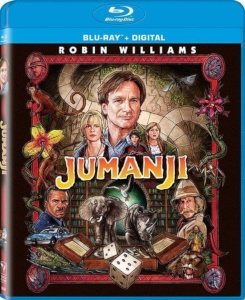2017 featured one of the longest time gaps between an original and a sequel when “Blade Runner” (1982) was followed with “Blade Runner 2049.” That franchise thus overshadowed “Jumanji” (1995) and “Jumanji: Welcome to the Jungle” (now available on home video). But in terms of quality, there aren’t many sequels that have made such a long leap from the original.
Directed by Joe Johnston (“Captain America: The First Avenger”), the first “Jumanji” was mentioned a lot in articles about ILM special effects in the 1990s, and rightfully so, as the lions, monkeys and vines that emerge from the board game to attack our protagonists still hold up pretty well today. It boasts the charms of Robin Williams; since his oeuvre is now finite, we can’t take that for granted. And it’s one of the films that made people say “Hey, this Kirsten Dunst girl could have a career in this business.”
But it’s also a tired, inoffensive 1990s family film that feels like homework when you watch it today. It’s frustrating that the central problem – Alan (Williams) being trapped in the board game – comes about because Sarah (Bonnie Hunt) stops playing even though the instructions clearly state that Alan will be freed if she rolls a five or an eight. As good as the special effects are for their time, there’s another nagging irritation: We never get to see “inside” the game like Alan does.

Right away, it’s clear “Jumanji: Welcome to the Jungle” is the superior picture. A “Breakfast Club”-style gang is thrown together, then their character traits get undermined when they take on their avatars inside the game (which is now a video game, because magic). Jack Black and Kevin Hart throw themselves into characters who are embarrassed to be Jack Black and Kevin Hart – the chunky Black because he is popular hot girl Bethany IRL, and the short-of-stature Hart because he’s actually a strapping football player named Fridge.
As nerd guy Spencer, Dwayne “The Rock” Johnson grabs the hero role we’ve seen before in “Journey 2: The Mysterious Island,” and has some fun trying out one of Dr. Bravestone’s strengths, “smoldering looks.” (That might not sound like a great strength, but consider that his weaknesses are “none.” Meanwhile, one of Fridge’s weaknesses is “strength.”)
As nerd girl Martha, Karen Gillan (Nebula in the “Guardians of the Galaxy” films) initially stands around looking hot, but then gets to break out her comic chops – and her chopsocky moves – in the movie’s funniest sequence. Martha utterly fails at flirting with the transportation-shed guards – overplaying the hip-swaying and hair-tossing from Bethany’s crash course – but makes up for it by tapping into one of her strengths: dance fighting.
Directed by Jake Kasdan, “Jumanji 2” is a delightful mélange of body-switching comedy and sly jabs at absurd video-game clichés. The common wisdom that there’s nothing more boring than watching other people play video games doesn’t apply here. It’s clearly established that once they use up their third life (the life bars are shown as tattoos on their arms), they will literally die. (The danger is also real in the original “Jumanji,” but it doesn’t ring true. We know the scenery-chewing hunter will not actually gun down the kids, and that the lion won’t eat them.)

Whereas the original film – based on Chris Van Allsburgh’s 1981 picture book – had to heavily lean on Williams’ charms to wring out emotions about family – the sequel by Chris McKenna (“Spider-Man: Homecoming”) and three other scribes builds genuine relationships. OK, there might be some wish fulfillment in the fact that Spencer and Martha have liked each other from a distance since seventh grade – and that nerds, as opposed to The Rock, are Martha’s type. It’s not until this video-game adventure that they are brave enough to say so, and to humorously kiss. (I’m glad their awkward attempt doesn’t result in an immediate breakup, as per Wesley and Cordelia in “Buffy” Season 3.)
“Jumanji 2” also includes commentary on our modern obsession with smartphones. A character who had been trapped in the game since 1996 remarks on Bethany being driven to distraction by not having her phone: “I feel like ‘phone’ means something different in the future.”
Luckily it’ll be a while till “Ready Player One” hits home video. I worry that it will feel a bit redundant if immediately compared to “Jumanji: Welcome to the Jungle,” which in my opinion marks the biggest original-to-sequel improvement in movie history.
“Jumanji” (1995): 2 stars
“Jumanji: Welcome to the Jungle” (2017): 4.5 stars

